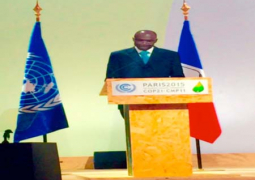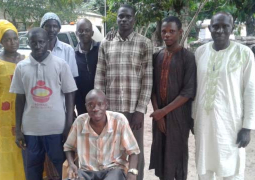During Lent Christians give alms, pray more, give up the good so as to obey their Maker and follow the example Jesus left. This is followed by the example in the Lord's Prayer, the Father... as in the caption above. Forgiveness is a difficult thing to do. Many have found it difficult but others try to forgive, as it should be. Lent is a true time to turn to God and be the real self before God. All in God's care acknowledges the power in this state of forgiveness as many use it differently in their different languages, e.g. "Bonketom (Jola), Balal ma (Wollof), Hakeh tu(Mandinka), Achina Hakeh, (Fula) and many more. Why the word "forgive" if the action is impossible? Let us find out from what Panorama can offer.
When the Apostles of Christ wanted to learn to pray, they asked Him to teach them to pray. Jesus firstly ordered them not to show off when they pray and not to raise a lot of unnecessary words as pagans would do, because Jesus said already what you ask for God knows it. He then warned that one prays in the darkness of his room and say: "Our Father, who art in Heaven hallowed be thy name thy Kingdom come. Thy will be done on earth as it is in Heaven, give us this day our daily bread and forgive us our trespasses as we forgive those who tress pass against us and deliver us from all evil amen. This became the base for what Christians today pray and fast to achieve.
Jesus talked on the forgiveness of trespasses against us by others. Christians therefore beg God for Him to forgive them, as they forgive others who trespass against them. But deep within people forget that it has never been easy to forgive others who have offended them. Many do not have forgiveness in their creed but love to say the "Our Father." Those with good understanding of the Lord's prayer that can analyse it know it better and would follow what it says to them, thereby forgiving readily. Some often behave like sheep in wolves clothing. Thinking that they are good and following the rules and regulations of the Bible but they only play act to show the world and their neighbours how good and pleasant they are. Others talk about people and see themselves as the best among the Christian community. There are those who become champions among defenceless people making it worst for others and their own lives because sin speaks to the sinner. Days are changing, the young are changing with time and they become hard to change and forgiveness becomes problematic. Many who say they forgive become truly confused as to whether to let go or become a forgiver. Many a time the offences become part of the sinner because they know Christians would forgive readily. There should not be a set intention for causing havoc against poor people on the notion of getting forgiveness when they as for it. Others have prayed not to wrong others because they hate to ask for forgiveness. Others fear to discourage others let alone offend them to ask for forgiveness.
Here is a 'true life' story Panorama would share with you. There was an old man who had only one son. He was called Ebou or Edi Boy. This poor lad was very hot tempered. His temperament had caused many to abandon him. He was quick to throw insult on elders, children, parents and neighbours. His old dad did not like it but had nothing to do since he was old. One day he called the young man and said to him, I have bought you a packet of nails, which you would use to nail on the big tree in the fence near our house. Do it this way the old man said. Each time you get very angry instead of insulting others at will, go and nail one of these long nails into the tree with vigour as you push it in. In less than no time the boy became very angry at what his dad said and went to nail it in the tree. Before five days, the nails were finished and they had made a big impact on the tree. On a Sunday he called the son and asked if his anger nails were finished. He said yes. He took his son to the tree and said pointing at the tree and said, each time you were angry you nailed and now take out these nails. The boy fought hard and got some nails out. Some could not come out at all. At the end, he said to the young man, "You see when you are angry the verbal bricks you throw, no matter how you throw them, when you want to withdraw them, they can never be right again. Just as the way you have destroyed the tree you are seeing so is it that you leave wound in the heart of others you offend. Therefore stop it and be good because no matter how you apologise and ask for forgiveness the mark will remain." The old man left his son to ponder.
During Lent therefore, all Christians are asked to check inwards to see what verbal bricks they have thrown, can throw or should not throw so that the world would be a peaceful place to coexist. But is said that "prevention is better than cure." To really abide by what Christ said to forgive those who trespass against us, one needs to fight hard during this period of forgiveness not to fall into sin so as to avoid the act of asking for forgiveness on a daily basis. Happy Lenten Season to all who are doing their best in whatever way to keep it holy.





